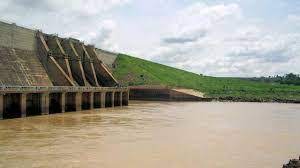The Federal Government recently commissioned the first phase of over N100 billion worth of Gurara irrigation project to boost agricultural production. JOHN OBA, was there for Blueprint
The Federal Government at the weekend commissioned the first phase of over N100 billion worth Gurara dam irrigation project to help boost agricultural production and supply of portable water to the FCT.
Commissioning the project, Vice President Namadi Sambo, said the purpose of the project was to supplement the raw water supply to Lower Usuma Dam for FCT Water Supply, generate 30MW of hydropower to resuscitate the industrial sector of Kaduna and rural electrification of the
surrounding communities and provide irrigation infrastructure in line with the Millennium Development Goal on Food Security and Poverty alleviation.
“The occasion is historic. The purpose of the project is to supply portable water to the federal capital territory, generate 30 megawatt of electricity, food security and poverty alleviation. The project is in two phases, the first phase is now being commissioned which is to supply water to the FCT and the surrounding community. The project will create jobs for the youth in the state and it is instructive to note that we have over 200 dams completed across the country.
He added that the hydropower generation would boost the
industrial sector in Kaduna State in particular and Nigeria in general in the area of job opportunities, wealth creation, and poverty alleviation to mitigate restiveness in the country.
In her welcome address, the minister of Water Resources, Mrs. Sarah Reng Ochekpe said that the irrigation component of Gurara Multi-purpose dam project covers about 6,000 hectares of irrigable land.
The Minister said that the project is a milestone achievement of President Goodluck Jonathan’s administration in ensuring sustainable development of the nation through the empowerment of the people.
“The commissioning of the irrigation component today of the Gurara Multipurpose Dam Project would further strengthen and complement the efforts of our counterparts in the Ministry of Agriculture in the implementation of the Agriculture Transformation Agenda”, she explained.
The Dam and its other components would further develop the region from intensive agriculture to modern industry with expected seasonal production of 4,500 ton of rice,6,700 ton of maize, 11,000 ton of melon and 18,000 ton of fruits.
She called on the community to view the project as belonging to them and to support its operation as this will offer gainful employment to the people and also empower them.
“This occasion today is of great significance as it marks one of the several milestones of the government under the leadership of President Jonathan. The project will develop 6000 hectares of irrigable land, promote fisheries and tourism development.
“The project as designed consists of construction of an embankment of 54m high and 3100m in length, spillway structure and stilling basin, dam intake and headwork structures, fisheries development and 30mw hydropower station.
Also speaking at the occasion, the Executive Governor of Kaduna State, Alhaji Muhktar Ramalam Yero thanked the government for choosing Kaduna for the project.
He said that the project will boost commercial activities of the community and the entire state. “Though the Dam will augment the raw water supply to Lower Usuman Dam for water supply to FCT, the greatest beneficiary will be Kaduna as the economy will improve by bringing development to the state”, he explained.
Speaking on behalf of the host communities, Sarkin Adra, Maiwada Galadima, promised the host community’s maximum support to the Federal Ministry of Water Resources and Salini Construction Company.
It could be recalled that the federal government has iterated through the minister of agriculture and rural development, Dr. Akinwumi Adesina, it readiness to turn around the potential of Nigeria through agriculture especially now that the price of oil has gone down.
This has led to the introduction of the Agricultural Transformation Agenda (ATA) that stakeholders has applauded as laudable as it aimed at making agriculture work for Nigerians especially rural farmers such that it becomes not just a development programme but also an income generating commercial activity. If this would be achieved, the technology transfer sub-system with the mandate of extension services to the farmers need to be strengthened.
It is also to build commodity value chains and the institutions required to unlock the country’s huge agricultural potentials with the targeted outcome such as add 20 million tonnes of food to the domestic food supply by 2015, create 3.4 million jobs and ensuring import substitution through the acceleration of production of local staples; aimed at reducing dependence on food imports and turning Nigeria into a net food exporter
A major success story of the ATA in 2014, was the news that Nigerian Food import bill had dropped by N466 billion, thereby, adding N780 billion to the economy during the period.
The minister had revealed that the government would work to sustain the momentum in the sector, adding that several value chain would be focused on.
He assured that the sugar industry will experience an upsurge in fortune as the quantum of national revenue that has been going into sugar importation is unsustainable, particularly in the context of dwindling oil fortunes and devaluation of naira.
Adesina stated that Nigeria is set to witness a take-off of agro-industrial clusters, known as Staple Crops Processing Zones which will create thousands of rural jobs, stem rural-urban population drift and add to food supply in Nigeria. The operation of SCPZ is expected to play a role in provision of rural infrastructure in the affected areas.
“The Ministry also anticipates a major increase in rice production in 2015, with the continued implementation of two-cropping system.
“In 2015, Nigeria may become a net exporter of rice, away from the decades of annual importation that has cost the country an average of N1 billion daily. Despite the new involvement of billionaires in rice farming, the small farmers will still continue to contribute significantly,” he said.
Corroborating Adesina’s position, Sarah said the ministry of water was striving hard to enhance the efforts in the agricultural sectors by increasing the capacity of the river basins’ irrigation projects across all season.



